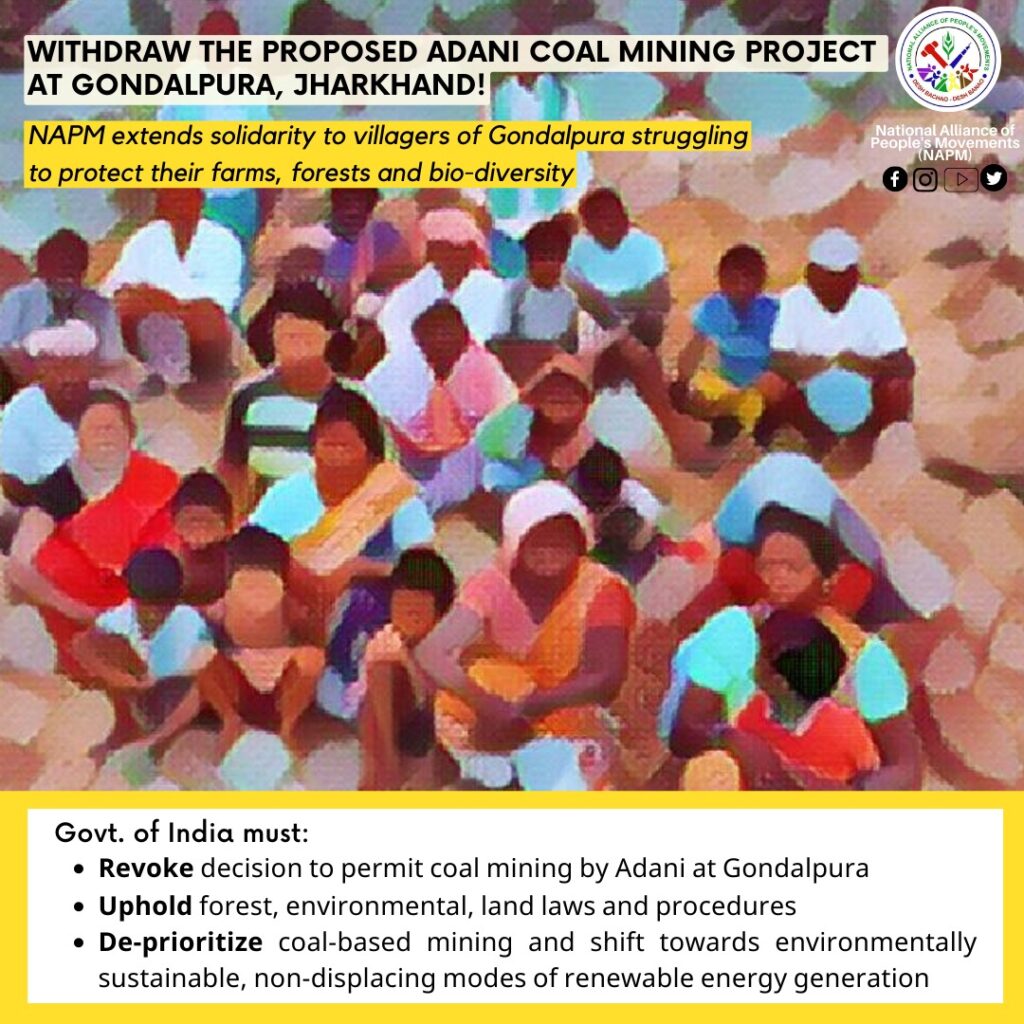Extending solidarity to the villagers protesting since many months against Adani’s proposed mine at the Gondalpura coal block in Hazaribagh, Jharkhand, the National Alliance of People’s Movements (NAPM)demanded that the Govt. of India to immediately revoke the decision to permit it.
NAPM said that it is distressing both the Centre and the State have paid no heed to the grave concerns raised by the moolvasi and adivasi villagers, (including SCs, STs and OBCs) who are keen to safeguard their lands, river and forest resources from ‘developmental’ destruction.
The Gondalpura coal block, with an estimated 176 million tonnes of coal reserves was auctioned off to the Adani Enterprises Limited (AEL) in November, 2020, as part of the e-auction for 41 coal blocks, for commercial mining, initiated by the Prime Minister. While the financial cost of this project is estimated to be close to 1 lakh crores, there seems to be little concern for the severe and long-term social and environmental costs.
As per available records, the coal mine is likely to obliterate over 500 hectares of farms, dwellings, and forests, generating over 229 million tonnes of solid waste. At least 5 villages including Gondalpura[1], Phulang, Hahe, Balodar and Gali would be affected adversely by the project. Coal mining activities in the district have already impacted the nearby villages, and hence there is intense resentment to the current project from the people, based on past experience.
While attempts were made to seek clearances and initiate project work in the midst of the second wave of the pandemic, surveyors sent by the district administration, NABARD and few Adani’s officials were not entertained and reportedly chased off by the villagers on a couple of occasions, in the latter half of 2021.
The villagers of Gali and their Village Forest Conservation Committee also formally objected to proposals of the Govt. seeking ‘Gram Sabha consent’ for the project related surveys, in Dec 2021.
Notably, the villagers have been up in arms against previous attempts of the Govt. as well (since 2006) to open up the area for coal mining. The coal block was then allocated to the Tenughat Vidyut Nigam Limited (TVNL). Villagers fiercely opposed the ‘public hearing’ in 2012, conducted amidst heavy police presence. All this indicates their staunch and consistent refusal to allow mining operations on their lands.
The area under question includes 513.18 hectares of land, of which 219.65 hectares is forest land. The farm land is fertile, which makes agriculture an important source of sustenance for the villagers. Crops like rice, sugarcane, wheat and mustard are part of the cultivation here.
If the coal project moves ahead despite the villagers’ resistance, NAPM feared that it will decimate villages, farmlands and forests. Villagers are also worried that the already affected elephant routes will be further disturbed by the coal mining activity, resulting in crop loss and danger to human habitation. They also feel such extensive coal mining would have severe climatic impacts over time, including erratic crop cycles and unseasonal rains etc.
Concerns have also been expressed regarding the pollution that would be caused to the Badmahi river, an important lifeline of the region. Environmental experts fear that the actual waste generated due to mining, could be much higher than indicated by project proponents and this would imply an additional land destruction of 103.26 hectares, over and above land used for the actual mining, it added.



